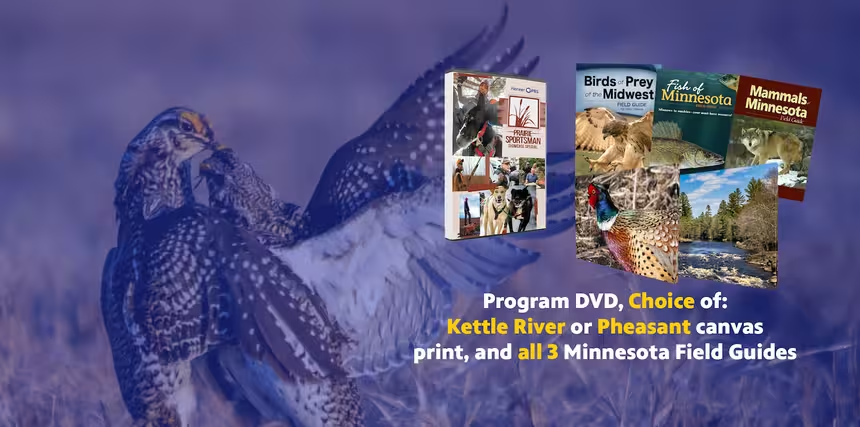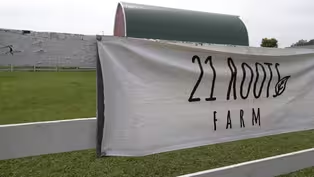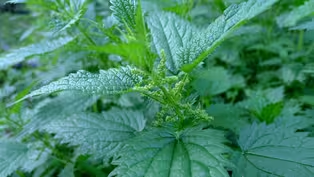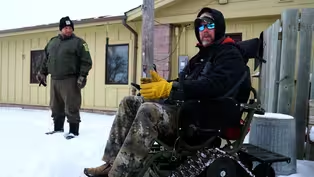Prairie Sportsman
21 Roots Farm
Clip: Season 16 Episode 9 | 11m 46sVideo has Closed Captions
21 Roots Farm provides opportunities for young people with developmental disabilities.
At 21 Roots Farm, young people with developmental disabilities tend to gardens and farm animals while they develop work and life skills. Farmers work year-round, three days a week at the nonprofit farm where they harvest and package produce for their customers.
Problems playing video? | Closed Captioning Feedback
Problems playing video? | Closed Captioning Feedback
Prairie Sportsman is a local public television program presented by Pioneer PBS
Production sponsorship is provided by funding from the Environment and Natural Resources Trust Fund and Shalom Hill Farm. Additional funding provided by Big Stone County, Yellow Medicine County, Lac qui...
Prairie Sportsman
21 Roots Farm
Clip: Season 16 Episode 9 | 11m 46sVideo has Closed Captions
At 21 Roots Farm, young people with developmental disabilities tend to gardens and farm animals while they develop work and life skills. Farmers work year-round, three days a week at the nonprofit farm where they harvest and package produce for their customers.
Problems playing video? | Closed Captioning Feedback
How to Watch Prairie Sportsman
Prairie Sportsman is available to stream on pbs.org and the free PBS App, available on iPhone, Apple TV, Android TV, Android smartphones, Amazon Fire TV, Amazon Fire Tablet, Roku, Samsung Smart TV, and Vizio.

Prairie Sportsman Premium Gifts
To order, email yourtv@pioneer.org or call 1-800-726-3178.Providing Support for PBS.org
Learn Moreabout PBS online sponsorship(upbeat music) - Here at the farm, like working here with animals.
It actually helps me be more, a good employee.
I really love my job working here.
And I really like sharing about my experience.
That is my dream about working here, like full-time job.
(upbeat music) (chill music) - [Bret] At 21 Roots Farm in Grant, Minnesota, Molly tends to the goats, chickens and alpacas.
She grows beans, tomatoes, and a variety of other produce that is packaged and sold to customers.
Like many of her farmer friends, Molly was born with an extra copy of chromosome 21.
A genetic condition known as Down syndrome.
All the farmers at the non-profit have some type of development disability.
And 21 Roots provides them with meaningful work as they develop life skills.
The farm's co-founders, Brittany Wiitala and Amy Peterson, started dreaming about a joint-venture while they worked together at a camp for youths with autism.
(upbeat music) - It was just kind of this idea of .. and be able to serve and work with people with developmental disabilities.
We didn't start, set out to start a farm, but it kind of evolved just kind of naturally.
I grew up in a dairy community in central Wisconsin.
And so I always knew where my food came from.
Amy has this passion for animals, and just like their therapeutic benefit that we kind of put it together, and it was like it kind of sounds like a farm.
(chuckli..
Working at a group home, I kind of realized people didn't have a choice in what they ate, let alone knowledge of where their .. And then kind of the task that people were employed to do just weren't very meaningful, and so they weren't motivated.
And so we kind of thought, "Yeah, is there an opportunity to make meaningful work "and get to eat the fruits of your labor?"
And so we're doing it.
(chuckling) (upbeat music) - [Bret] After forming a non-profit in 2019, Amy and Brittany purchased the 21 acre farm and started the youth club.
- I was working for a family that had adopted three kids with Down syndrome.
They were young, and so that was kind of the pull we had.
And then kind of did a separate adult program as we were like starting out and not knowing where.
They say, "If you build it, they will come."
And so it's happened, it's true.
(laughing) (upbeat music) - We had to start somewhere.
And so we had like maybe 12 chickens.
They were all free ranging in the orchard.
We had two goats.
And it was one of those things we're like, "Oh shoot, the goats are coming."
And we had to like run to Fleet Farm and buy everything that said "Goats."
And like they came the next day and that was kind of it.
Chickens and a couple of goats.
(upbeat music) We started and it was very simple.
We kind of just threw out some programming to see what would stick with families.
We had port-a-potties.
We didn't have chairs.
We didn't really have a lot of money.
(chuckling) So we rented a couple of things, rented some chairs.
And we just launched some programming.
- [Bret] Today, adults with disabilities work at the farm year-round, three days a week.
Farmer Molly showed us around last summer.
- Okay, right this way.
- Molly comes in and she's just ready to go.
She gives me the energy that I need sometimes to just get ready, 'cause it's like, "Well, Molly's gonna be here."
And she's gonna make me work.
She's amazing, I love her.
- And then here's our apple trees and pear trees.
(upbeat music) This is a chicken tractor.
This is where they have food and water, and eggs.
For our chicken chores is like give them water, and hand out food.
These lovely girls are so nice.
And like they lay one egg per day.
We do have like different colors of eggs.
(upbeat music) Okay, let's now work our way down.
This is one of the beehives, because we have two beehives.
And this is our barn.
This is where our donkeys are.
Their names are Izzy and Dolly.
And then we have our goats and alpacas over here.
Come here, girls.
They're really nice.
They do have names.
There's a crowd of goats just like coming like around me sometimes.
Because I am the goat whisperer.
(upbeat music) - I lead the animal time.
And so it's usually a very intentional animal project that happens to be maybe mixing feed or trimming goat's hooves, or sometimes it's just spending time with the animals and getting them used to people and being handled.
And maybe just, "Hey, we're gonna put some grain "in the back of the barn and see which cows come in."
To see who is comfortable with us.
(upbeat music) We will go outside rain or shine, cold or snowy, or sunny and hot.
You know, depending on how hot and how cold and snowy.
We tell everyone that they're farmers.
You know, like I'm a farmer and our program participants, they are farmers.
So everyone's a farmer and farmers have to work in rain or shine.
We're looking for frozen chicken waters.
We're you know, thawing things out sometimes.
We are going on snowshoe walks instead of nature walks.
We have beef cows.
We've raised just a few for beef.
And we usually just use it as like kind of a fundraising thing.
It's not like we're raising beef every single year.
Our programs, we do charge for that.
So those offset the cost of operation.
Hiring some more staff.
That sometimes just gets higher in cost.
So then we have to fill in for some fundraising.
(gentle music) - [Bret] The property came with pole barn that's been remodeled to include a kitchen.
Tower gardens named after the farmers favorite celebrities.
(gentle music) And community space, where farmers package produce for their customers.
(gentle music) - Remember if you see really giant beans- - We wanna give them.
- It's up to the cows.
- We'll give them to the- See look at these ones?
- [Bret] While farmers bag up goods- - [Bret] Molly shows us where the food is grown.
- This is our garden.
This is where we planted carrots and beets, and onions, and some beans as well.
This is kind of like different kinds of beans.
There's like rattlesnake beans.
Rattlesnake beans are kind of like rattlesnakes.
Kind of like really curly.
These are all the cabbages we have.
We do have like purple cauliflower and green cauliflower.
It's so good.
(upbeat music) So this is where our tomatoes are.
Sweet tomatoes.
And this is actually it helps that.
It tastes really good, make us healthy bones.
Makes more healthier, so that we eat more.
This is all of our herbs.
We do have mint down there and cilantro.
I like to grow my own food a lot sometimes.
Sometime is just like awesome for me to eat them for dinners and stuff.
(bright music) After produce boxes are packed, farmers write notes of thanks that are emailed to customers.
- My favorite experience of this week was picking zucchini.
We loaded them on the belt cart.
I want to thank you for giving you meals.
- Great, and then we'll send it off.
- And we will send it off.
- As far as products year-round, we have eggs that we sell.
We do our honey and we tap our maple trees.
So we do maple syrup, as well.
- [Farmer] Nice work, Katie!
- [Bret] Farmers also craft items to sell.
- [Speaker] Are you guys all working hard?
- [Worker] Harder, yeah.
- [Speaker] He's working hard.
- Last year we've kind of been been experimenting with making some dryer balls from our alpaca and sheep wool.
And so we'll process that fiber with our farmers.
And that's a very long and tedious process, but it's really fun.
- [Speaker] Teamwork!
Teamwork makes the dream work!
- And then we'll also do some soap making.
We'll do some crafty-type things.
We'll maybe do a pop-up little market that's like seasonal.
Or we do a big winter market every December.
(upbeat music) - [Bret] 21 Roots Farm primarily serves young adults.
The nonprofit continues to welcome up to 15 kids for three-hour summer sessions on Tuesday and Thursdays.
- They're kind of just getting used to the farm and just seeing like is it something they'd be interested in as adults.
I think those (gate clanking) younger exposures kind of have guided me in my life.
So I think the same with our youth.
- I think a big next step for us is that employment program.
And just like you know, we've been able to see our adult farmers become experts here on the farm and really take ownership in whatever area that they are interested in.
- I often look at myself as like I'm a guide.
And so I'm not really like leading or directing, I'm kind of guiding.
And then whatever supposed to happe.. (upbeat music) We had this guys who's in his 30s.
And we get like a sheet of paper that says he's dreamt of being a farmer his whole life.
So I'm immediately jazzed.
And I'm like, "Yes, we're gonna get a job "at a farm down the road, this is gonna be awesome."
And we meet him and he's like the slowest moving guy.
And every speck of hay he's picking off.
And so I was like, "Maybe not the idea "of a farmer that I had in my mind."
So like bring it back.
So I watched him and he was at the fence line, and he's telling everyone, "Be nice to the cows, "Be nice to the cows."
And so then I thought, "What if he did showmanship?"
And so we were able to like work with a steer.
And he trained the steer.
And I think his attention to detail and needing everything to be clean got to shine.
Because he has to make sure every spec of hay is off of his prized show steer.
- [Bret] 21 Roots Farm held a fair so the young man could show off his skills.
- He got to show his family the grooming process.
And so he got the cow into the shoot.
Did everything that was necessary.
We're all in tears because it just like all came together.
And his mom sat back and said, "He won't even put his dishes in the dishwasher "when he's at my house.
"How did you get him to do this?"
But being able to just see that independence and that confidence that he had.
It kind of all came together in that moment and it was beautiful.
(gentle music) - [Bret] After a day of witnessing the pride 21 Roots farmers take in caring for their animals and packaging the fruits of their labor, Molly bid us a fond farewell.
- Thank you everyone for your support, and everything that we make and do.
And my, well, teachers are fun and they really like me a lot.
And thank you so much, and have a good day!
(upbeat music)
Action Trackchairs and Empowering Youth With Disabilities
Preview: S16 Ep9 | 30s | Bret tests out new chairs aimed at helping folks with mobility issues enjoy winter trails. (30s)
Video has Closed Captions
Clip: S16 Ep9 | 5m 20s | Forager Nicole Zempel shares how to harvest the bounty of the nettle plant. (5m 20s)
Video has Closed Captions
Clip: S16 Ep9 | 8m 30s | Bret tests out new chairs aimed at helping folks with mobility issues enjoy winter trails. (8m 30s)
Providing Support for PBS.org
Learn Moreabout PBS online sponsorship
- Science and Nature

Explore scientific discoveries on television's most acclaimed science documentary series.

- Science and Nature

Capturing the splendor of the natural world, from the African plains to the Antarctic ice.












Support for PBS provided by:
Prairie Sportsman is a local public television program presented by Pioneer PBS
Production sponsorship is provided by funding from the Environment and Natural Resources Trust Fund and Shalom Hill Farm. Additional funding provided by Big Stone County, Yellow Medicine County, Lac qui...





